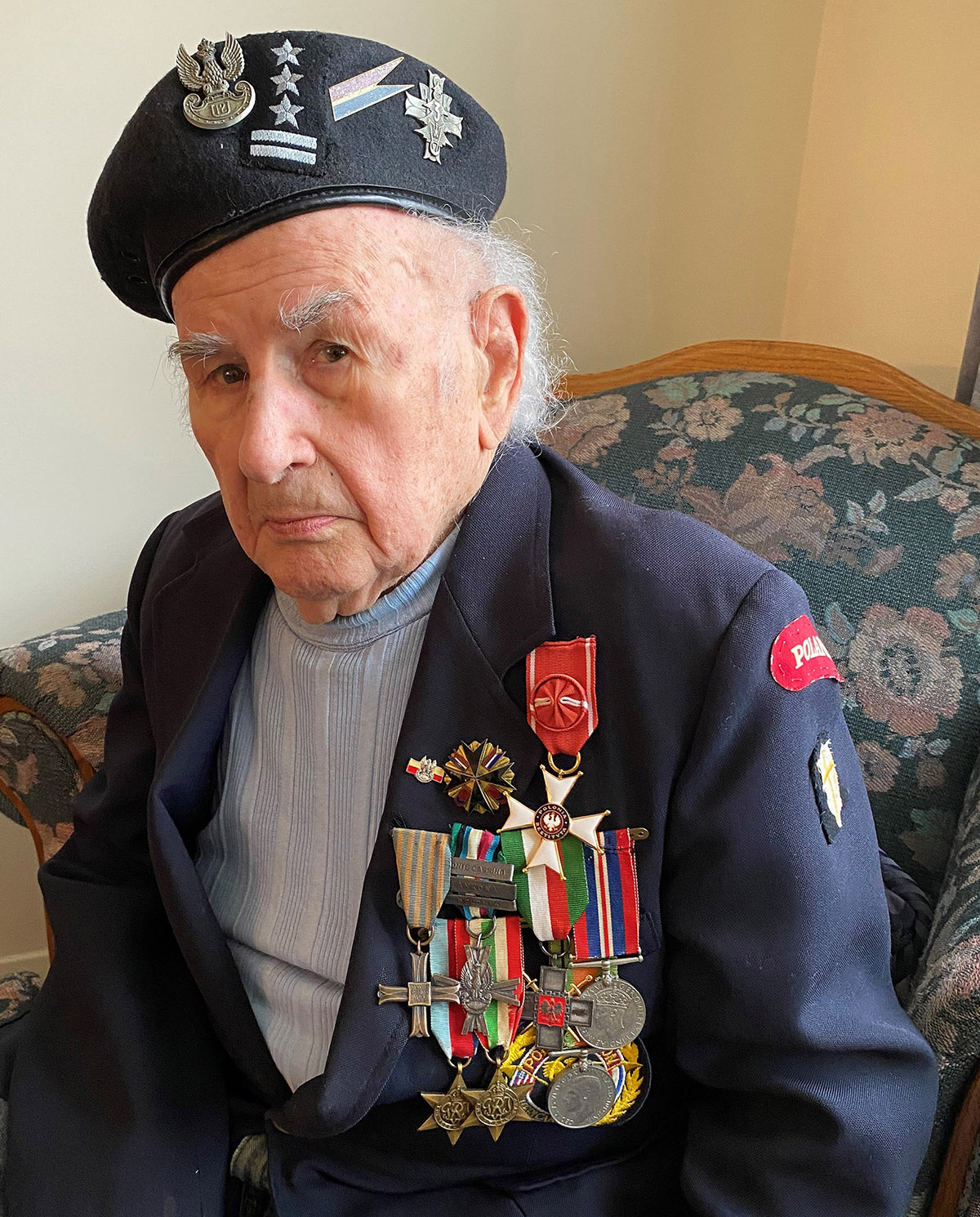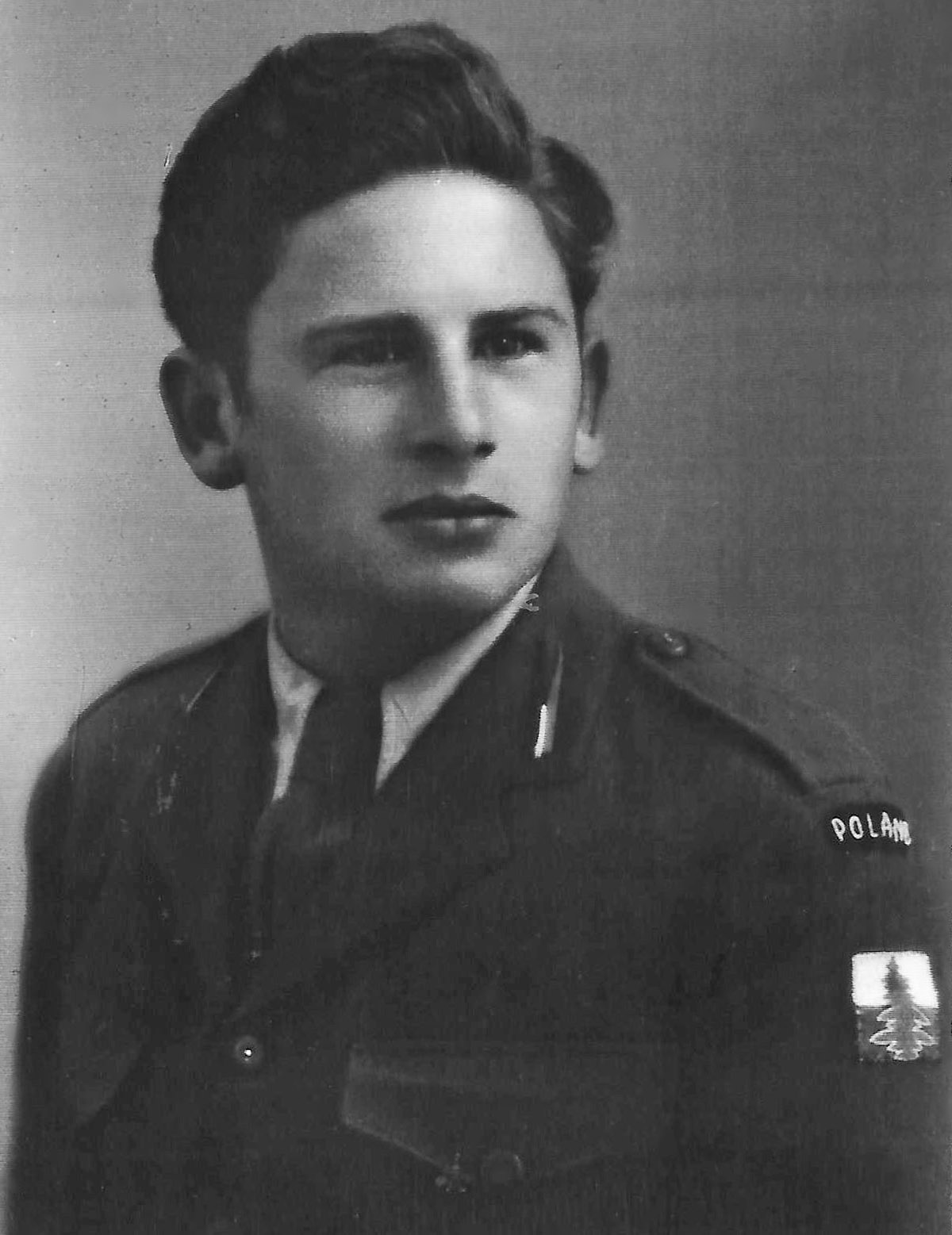Article by Gwen Jones, Department of Family Services
(Posted 2024 January)


At age 98, Romuald Lipinski spends a lot of his time reflecting on the past. Much of his youth was devoted to simply surviving. His perseverance allowed him to escape Siberia, survive combat during World War II, and get an education. He credits his innate optimism with helping him overcome the many obstacles he encountered, allowing him to finally enjoy a happy and fulfilling life.
Romuald Lipinski was born in 1925, the youngest child of Edward and Salomea Lipinski. The family lived in Brzesc, Poland, where Edward’s job as a railroad physician and Salomea’s work as a midwife provided a nice middle-class life. Lipinski recalls a happy childhood, where his favorite activities included climbing trees and reading. At 10-years-old, he was an avid reader, and by age 14 was devouring huge books in a single day.
In September 1939, Germany invaded western Poland while Soviet forces began occupying eastern Poland, where Brzesc was located. Under Soviet occupation, the family was forced to move to a one-room apartment, where despite the small space, they often welcomed refugees, Polish soldiers, and anyone else who needed a meal and a place to stay. In the chaos, Lipinski missed a year of school. The following year, he was able to attend school but found that communist indoctrination had become a major part of the curriculum under Soviet rule.
In February 1940, the Soviets began deporting Polish citizens to Siberia. On June 21, 1941, two Soviet soldiers came to the Lipinski home, telling them that they had an hour to pack, then loaded them on a truck destined for the train station. By this time, Lipinski was the only child still living at home. Although the experience was terrifying, they were lucky because they were allowed to stay together while other families were separated. Lipinski considers his deportation to be the beginning of his own odyssey, where he would endure many things while hoping only to someday return home. “Somehow, I never lost my firm belief that our experiences are only temporary and things will turn for the better. This strong optimism throughout the entire duration of my odyssey helped me enormously,” he remembers.
Eventually, the family learned that the Soviets had granted amnesty to Polish exiles so they could form an army to fight against Germany. The family was able to join the Polish army – his father serving as a doctor, his mother as a nurse, and Lipinski as a volunteer.
The army was being evacuated to Persia, but the family was prevented from traveling with them when Lipinski contracted Typhus. After weeks of illness marked by delirium and a high fever, Lipinski recalls finally being able to sit up on Easter Sunday, 1942. In July 1942, the family was able to get on another transport to Persia, happy to escape the Soviet Union.
In January 1943, Lipinski was drafted into the army, said goodbye to his parents and traveled to Khanaqin, Iraq, where the Polish Army, which fought as part of the Eighth British Army, was stationed.
Lipinski was assigned to the 12 Podolski Lancers Regiment as a member of the mortar platoon. Every day they practiced operating the mortars, handling their side arms, and driving trucks and infantry carriers. After traveling to Palestine and then Egypt, they were loaded onto transport ships destined for Italy. They arrived on December 21, 1943, at Taranto, located at the base of the heel of the Italian boot. Weather conditions were bad and food scarce, but after several weeks, they began their trek north. The regiment’s first combat position was a small village in the mountains where soldiers slept in a bombed-out church and a goat stable. The greatest danger came from the mines that were buried everywhere.

The regiment trained before being sent to Monte Cassino on April 30, 1944. After ascending single file on a narrow footpath, the soldiers dug in, hunkering down in shelters not far from the enemy. On the night of May 11, 1944, they began their offensive and after days of fighting, the Germans withdrew, leaving some of their wounded behind in the ruins of a monastery. On the morning of May 18, Lipinski’s regiment placed their banner on the highest point of the monastery, signaling that they had taken it. Lipinski’s service continued in Italy before being sent to Cadet Officers school, where he graduated in May 1945, just as the war in Europe ended.
After the war, Lipinski remained in Italy, determined to get an education, having become proficient in the language during his service. He studied chemical engineering in Turin. After a year, he traveled to Beirut, Lebanon, to visit his parents and decided to stay and study at the French University where his tentative French was helped by his knowledge of Italian and Latin. Although he enjoyed living in Beirut, he was ordered to join his regiment in England, so he and his parents set sail for England in summer 1947.
Lipinski considers the four years he spent in Leicester, England, pursuing his education to be the most difficult of his life. He was required to start all over and struggled to master English, all while navigating an unfamiliar educational system. He became so obsessed with studying that he developed insomnia.
A bright spot during this time was reuniting with his brothers – Wladek and Tadek. Wladek was injured while serving with the Polish Parachute Brigade and married a Scottish nurse following the war, and Tadek worked in Manchester as a structural designer. In November 1951, Lipinski visited Tadek and they attended a dance at the Polish Combatants Association Club. At the dance, Lipinski met Izabela (Iza) Zienkiewicz. Iza was also a Polish refugee whose family had been deported to Siberia in April 1940.
After knowing her only a short time, Lipinski loved Iza but learned that her family was planning to emigrate to the United States on January 15, 1952. On New Year’s Eve, he traveled to Manchester and proposed to her. After a long separation, Iza returned to England in August 1952 and the two were wed. Iza believed that the U.S. offered the couple more opportunity than England, so with his father’s encouragement, Lipinski agreed to emigrate to the U.S. After waiting for a visa and passage on a ship, he finally arrived in the U.S. on December 21, 1953.
The couple settled in Perth Amboy, NJ, and Lipinski began taking night classes at the Newark College of Engineering while working during the day. In 1956, their son Adam was born. In 1957, Lipinski graduated with a bachelor's degree in civil engineering and the following year, he and Iza became U.S. citizens. The couple had two more children – Eva in 1960 and Yolanda in 1964. Lipinski earned his master’s degree in civil engineering in 1961.
After working various jobs, Lipinski set his sights on a career with the federal government. He accepted a job as a civilian employee with the U.S. Navy designing antenna towers. The job was in Washington, D.C., so the family moved to Annandale in July 1965. Iza chose their home because it had a large yard for their children. After four years with the Navy, Lipinski joined the Nuclear Regulatory Commission, where he worked for 22 years. After retiring from the NRC, he worked for the Idaho National Engineering Laboratory for six years. In addition to his 9-5 job, Lipinski taught courses at the University of Virginia, the Department of Agriculture Graduate School and Northern Virginia Community College.
The Lipinskis returned to Poland several times after emigrating to the U.S. In 1972, while visiting the site of the Warsaw Uprising, Lipinski remembers experiencing deep grief, saying, “I have to confess that when I came to the marketplace in Warsaw, I knew that every cobble was soaked in the blood of young people, I started to cry. For me, it was very, very emotional.”
In 1994, the couple visited Italy to commemorate the 50th anniversary of the Battle of Monte Cassino. While there, Lipinski and a fellow service member crossed paths with three German ex-paratroopers and the old soldiers began reminiscing. “That was an interesting conversation. We were telling them how we tried to kill them, and they were doing the same – how they were trying to kill us,” he recalls.
In 2019, Iza passed away suddenly. The couple had been married for 67 years and shared three children, six grandchildren and one great-grandchild. To his knowledge, he is the last Polish WWII veteran still living in the area.
This article is part of the Golden Gazette monthly newsletter which covers a variety of topics and community news concerning older adults and caregivers in Fairfax County. Are you new to the Golden Gazette? Don’t miss out on future newsletters! Subscribe to get the electronic or free printed version mailed to you. Have a suggestion for a topic? Share it in an email or call 703-324-GOLD (4653).

